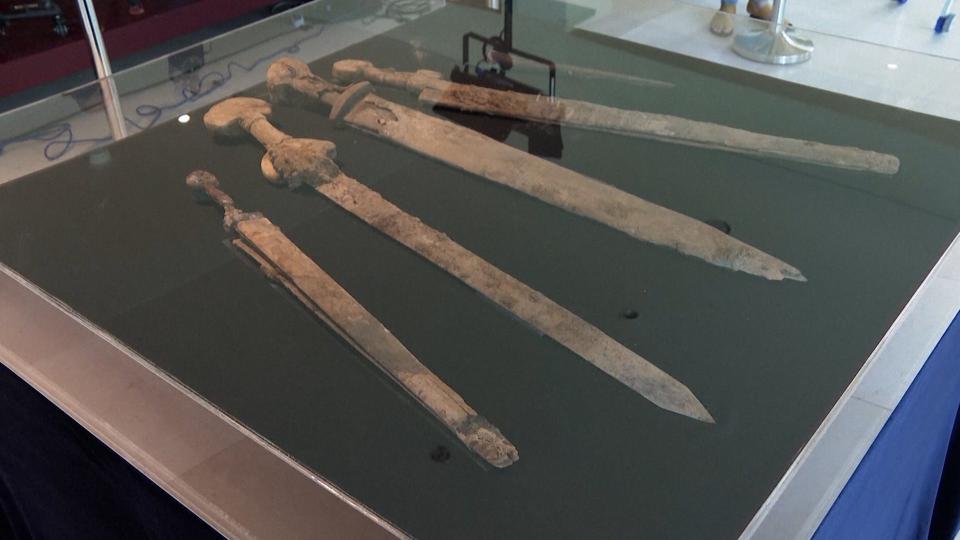Preserved Roman swords dating back 1,900 years found hidden deep in Dead Sea cave
- Oops!Something went wrong.Please try again later.
A cache of "excellently preserved" Roman weapons tucked away in an isolated cave near the Dead Sea have been discovered by Israeli researchers.
The Israel Antiquity Authority announced the find on Wednesday, saying researchers originally entered the cave in hopes of photographing a prior discovery of ancient Hebrew words inscribed on rock formations in the cave.
Instead, the team discovered a hard-to-access crevice in the remote cliffs overlooking the sea. Inside were swords determined to be 1,900 years old, which the experts believe were once hidden by Judean rebels who seized them from Roman adversaries.
“The hiding of the swords and the pilum in deep cracks in the isolated cave north of ‘En Gedi, hints that the weapons were taken as booty from Roman soldiers or from the battlefield, and purposely hidden by the Judean rebels for reuse,” said Dr. Eitan Klein, one of the directors of the Judean Desert Survey Project, in a statement.
While further study is necessary, archeologists believe the swords were likely obtained and hidden during the Bar Kokhba Revolt (132-135 CE), thanks to the discovery of bronze Bar Kokhba coins at the cave's mouth.

A time capsule in Lake Michigan: 'A time capsule': 156-year-old sunken ship found in pristine condition in Lake Michigan
What they found
According to the statement released by Israel Antiquity Authority, the weapons were found shoved within the cave's crevices themselves, making them almost impossible to reach.
Initially, a shafted weapon similar to a javelin known as a Roman pilum was discovered squeezed in the rocks' cracks, along with pieces of wood that were part of the swords' scabbards, or sheaths.
The team ultimately uncovered four swords, all of which were well persevered thanks to the dry, arid environment. Of them, three were identified as Roman spatha swords, with blades measuring 60-64 cm in length, and one was determined to be a ring-pommel sword, with a short 45 cm blade.
All four were found with their iron blades still sheathed in their wooden scabbards, boasting handles made with wood or metal. Leather strips and bits of wood and metal belonging to the weapons were also found in the crevices.
The swords were removed and transferred to the Israel Antiquities Authority laboratories for preservation and conservation. Further excavation of this and other areas are still ongoing.
"We are just beginning the research on the cave and the weapon cache discovered in it, aiming to try to find out who owned the swords, and where, when, and by whom they were manufactured," said Dr. Eitan Klein in a statement. "We will try to pinpoint the historical event that led to the caching of these weapons in the cave and determine whether it was at the time of the Bar Kokhba Revolt in 132–135 CE.”
Meteorite dated back 4.6 billion years: This meteorite is 4.6 billion years old. Here's what it could reveal about Earth's creation
What was the Bar Kokhba Revolt
This rebellion took place between 132–135 CE in Judea, part of what is now Israel. Judea had been a Roman ally and later province from 6 to 132 CE, though years of clashing and revolt predated this major conflict.
When 132 CE rolled around, unrest had already been brewing thanks to discontent with the Roman governor of Judea as well as the emperor Hadrian, who had put strict restrictions on the Jewish people's ability to observe and practice their religion and customs. When Hadrian's intentions to found a Roman colony in Jerusalem became known, a revolt ensued.
Jewish leader Bar Kokhba led the rebellion, which was eventually quashed by the brutality and might of the Roman military. After Jerusalem fell and Kokhba was killed, the conflict came to an end in 135 CE.
This was predated by the First Jewish Revolt which occurred from 60-70 CE, in which the Jews briefly expelled the Romans from Jerusalem. The Romans eventually broke into the city and razed it to ground, burning the Holy Temple inside and slaughtering the Jewish people within the walls.
This article originally appeared on USA TODAY: Roman swords found in Dead Sea cave dated at 1,900 years old

